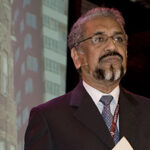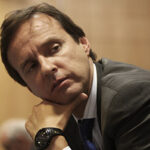Does democracy need a reset?
Some time back, we started hearing about ‘post-democracy’. Looking at the present state and quality of democracies across the globe, this year’s International Day of Democracy provides an exceptional opportunity to reflect and react to increasingly disturbing trends.
In certain countries, we see before us technocracy, growing authoritarianism or indeed populism, afflicting even some of our more mature democracies. With few other paradigms in sight, a post-democratic world would take us back to realities it took decades, if not centuries, to leave behind. In short, ‘post democracy’ vs. ‘democracy that delivers’. Let’s opt for the latter.
Citizens are perplexed – they know what they do not want, at times expressing their rejection through vigorous and even violent protests; but they have much less clarity about the future they do want and how to get there. The apparent row between the market economy and democracy is often blamed for this apprehension. How can a basically healthy coupling become a source of social tension? The answer lies in the persistent existence of excessive imbalances. As some of the G20 leaders pointed out during the Hangzhou Summit last week, if the global challenges of inclusiveness and inequality remain unaddressed, the populist backlash against globalization could endanger the global economy. Along these lines, the final G20 Communiqué states that leaders will “strive to reduce excessive imbalances, promote greater inclusiveness and reduce inequality in our pursuit [emphasis added] of economic growth”.
By definition, the market economy brings with it a certain level of economic and social inequality. Non-discrimination and equal opportunity, however, are fundamental aspirations of democracy. A balance, therefore, must be sought. Not tackling the need for this balance is today one of the persistent threats to democracy. Since the financial and economic crisis started in 2008 – the year, by the way, in which International Day of Democracy was first celebrated -, globalization has widened the income and income distribution gap within (but not among) countries. Irrespective of our different political beliefs and ideologies, it is evident that, when social inequalities increase within a country for a sustained period, the logic of capitalism prevails over that of democracy. Democratic institutions must be capable of effectively diminishing unreasonable inequalities and actively pursue, at the very least, equal opportunity.
It is not easy to tread the middle ground between long-term gain and short-term pain, particularly under conditions of economic stagnation and stress. Governments are often driven to reforms that, while meant to create growth in the long-term, end up imposing significant, short-term burdens on their citizens. The call for growth and trade as a means of achieving better and greater distribution is insufficient. A sustained regression in social and economic rights, particularly when it affects the poorest and most vulnerable sectors in society, constitutes an undeniable decline in the quality of democracy – and it also slows growth.
The UN has decided to have this year’s International Democracy Day focus on the 2030 Sustainable Development Agenda, to which drafting process the Club de Madrid actively contributed. While the Agenda directly refers to democracy only in its Introduction, it does provide a basic framework for tackling a sustainable rebalancing of the market economy and democracy, way beyond the simple call for growth. Implementing it is our global democratic task.
Among other characteristics, in a ‘post-democratic era’ there is a feeling that decisions are not always democratically taken by elected representatives, but rather by other non-State actors. Democratic leadership should listen to the demands of citizens; it seeks ‘democracy that delivers’. We must support and reinforce this kind of leadership and this may entail resetting democracy when and where gridlocks exist. We cannot allow non-democratic actors to force a post-democratic era upon us. Economic, social and political actors should be searching for transformative ideas and practices to put democracy back on track. The most progressive recipe is sometimes just going back to the basics.
Signed by
- Dr Vaira Vike Freiberga, ex President of Latvia and Club de Madrid President
- Tuto Quiroga, ex President of Bolivia and Vice-President of the Club de Madrid
- Cassam Uteem, ex President of Mauritius Vice-President of the Club de Madrid
The Club de Madrid comprises 112 democratically elected former Prime Ministers and Presidents, whose mandate is to foster democratic values and leadership. The Club also provides a forum for the discussion of issues of global concern where each Member expresses his/her own views.



